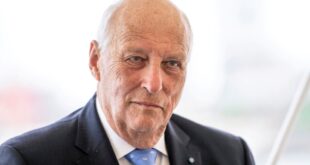After the owners of Royal Mail agreed to a 5-billion-pound takeover bid, people in the UK and abroad became curious about the Czech billionaire Daniel Křetínský behind the offer and how he accumulated such a vast fortune. Unfortunately, the answers raise further questions about the health and security of our democracies.
The upper house of the Czech Parliament, the Senate, held a conference on May 23 titled “Clientelism as a threat to democracy and market environment” where the influence of oligarchs on Czech society was widely debated.
One of the speakers, Radek Kubala, an analyst of the Reset organisation, spoke to our editor Albín Sybera about how the oligarchic concentration of wealth and influence in the Czech Republic has been growing for decades and how their influence is spreading across the West.
Albín Sybera: The oligarchisation of the Czech Republic is a topic that may have lost some of its impact after the 2021 elections, with the departure of Andrej Babiš from top politics, but which should perhaps be all the more relevant in discussion today as his ANO party dominates Czech national polls.
We also see today that Czech citizens continue to pay some of the highest fees in the energy sector, in telecommunications, in sectors that could be said to be monopolised by certain companies, such as PPF and EPH. At the same time, these are companies that are very active in the Czech media and are some of its key owners.
Mr Kubala, would you like to summarise the most important points from the Czech conference on clientelism?
Radek Kubala: The conference was organised by the independent senator Marek Hilšer. I think it was a good move on his part, because rarely is such a topic discussed at such a high level, and it takes a certain type of courage to discuss, even though it is such an important topic.
There were quite a few people in attendance, but I was a little disappointed that there weren’t as many senators. In addition to Mr Hilšer, Senator Jitka Seitlová, a People’s Party (KDU ČSL) senator, and David Smoljak from STAN (Mayors and Independents) attended, but otherwise it did not generate such a response.
We discussed the topic of supervisory institutions and how well they work, or rather do not work – these are institutions in our country that should prevent oligarchisation, or at least help to regulate it in some way.
There were also case studies. I presented a case study of Daniel Křetínský’s EPH company and how it contributes to the oligarchisation of the Czech Republic, but other presentation topics included how large building companies influence the entire construction business and the entire housing policy, as well as the concentration of ownership in agriculture.
We also talked a lot about the oligarchisation of the media and what impact this has on journalism and society as a whole. This includes the situation in Slovakia with Markíza TV, which is owned by PPF, and also how difficult it is to trace real owners in the Czech Republic – how completely non-transparent the register is, how sometimes it is difficult to trace any owners at all, and so to find out the true degree of oligarchisation in the Czech Republic.
Overall, there were a lot of interesting contributions. As I said, I think it is very important that this topic is being raised this high up in the Senate.
There have been a lot of studies in the past few years about how the Czech Republic is a a highly kleptocratic country, in the sense that there is a large concentration of property in the hands of an elite few and that at the same time, these properties are very often tied to business with the state. Many of these studies come from abroad, whether it is The Economist (Czechia sits behind only Russia on the latest crony-capitalism index) or other reputable organisations, but have we seen more domestic production of such studies in recent years?
With the entry of Andrej Babiš into politics, oligarchisation started to be discussed in some way, and even though the topic is primarily framed by the one oligarchic clique around him, it also opened up the space for a debate about other oligarchic cliques, Daniel Křetínský, PPF and so on.
In this sense, I think the discussion has gradually shifted, including the debate about the media. It has not shifted fundamentally, but it has opened up the space for these debates, which until then had been completely closed.
Would you like to recount the study of your home organisation Re-set in some way?
I was dealing with Daniel Křetínský’s EPH company, particularly in terms of climate impact. This was part of our campaign that we presented in the Senate. We talked about how EPH came to be such a giant, with strong connections to politicians, whether former Czech Prime Minister Mirek Topolánek or the Smer Party of sitting populist Prime Minister Robert Fico in Slovakia.
We also talked about EPH’s links to Russia and how Daniel Křetínský’s media here in the Czech Republic influences the whole public debate and how he uses it as a tool of clientelism. I tried to capture how he’s using that network of contacts connected to politicians and how that has led to Daniel Křetínský becoming the second richest man in Czechia.
If we look at Daniel Křetínský’s background, he started out at J&T, which is, perhaps, the main symbol of privatisation in Slovakia. Could you highlight some other key points along that rise, perhaps some of the ways in which EPH is trying to adapt to the new reality after Russia invaded Ukraine?
They don’t need to adapt much because Daniel Křetínský has been having a tremendously great time over the last two years. He has made gigantic profits, especially because of the energy crisis he has contributed to, given that he helped cement our dependence on gas, the price of which has gone up.
Here, I think we can clearly see some injustice and how oligarchisation is damaging society, because one group, one person and one company is managing huge resources for its own profit, while the rest of society is experiencing a huge decline in living standards, sinking into energy poverty. When some company, some person, is able to bend the rules in their favour, at the expense of society, it’s just not right. And then we can ask, as Marek Hilšer did at the conference, whether we have a democracy, or whether we have ended up in a dictatorship of oligarchy. That is the key question that arises for me.
As you mentioned, we have seen the regional rise of EPH during the energy crisis, during which it has announced record profits in its history.
In the past two years, we have also seen a huge rise of EPH in the West, including acquisitions in Germany, Great Britain and Holland. The latest news is that the owner of the British Post Office, IDS, has recommended Royal Mail, the oldest operating postal service in the world, for takeover.
In the past, EPH has forced its way into an increasingly strong position in the Czech Republic by bending the law. I remember that Britské listy often wrote about how one of the companies, AVE, the waste company in which Daniel Křetínský has been one of the key shareholders for a long time, has been bending the fees on the storage of waste in landfills for a decade. Today, that company is under investigation by law enforcement authorities.
Of course, the Royal Mail takeover still has to be approved by the shareholders and by the government, and there’s an election in Britain in July, so the takeover won’t necessarily happen. However, when I read about Daniel Křetínský and the Royal Mail, these scandals are rarely mentioned.
Would you say that this is one of those concomitant phenomena, where we see the influence EPH also has in the media? They’re actually probably the biggest media house on the market in the Czech Republic.
Yes, you could say that. In the UK, he’s trying to acquire Royal Mail, but he’s also trying to acquire the Telegraph publishing house, which has a significant influence on the whole environment of the Conservative Party and that spectrum of voters in the UK.
Not only would that give him better access to politicians, but also allow him to influence the debate there in some way, to set the agenda and so on. I think Křetínský is trying to create the impression in the West that he is a great supporter of freedom, of liberal democracy, and that he is buying media to help preserve the culture of debate.
In our country, as we can see, it’s not quite like that. But it’s hard to break through the image that he’s building up in the West, because he has much easier access to the media and because he pretends in the West that he’s part of this Western oligarchy of the rich.
So an oligarch, but a nice one?
In our country, we can see that he’s a kind of Russian oligarch with a Czech passport, as we like to say. Hopefully, that reality is gradually coming to the surface in the West as well. More and more journalists from the West, people who are interested in this, are getting information about what’s going on here.
It is also not just a question of Britain and France. In Germany, there is a big debate about Křetínský now because he is buying part of the Thyssen Krupp steelworks, so he is in some public debate again. I think that the truth will gradually reach the West, but in the beginning, he was able to give interviews, he was able to create that image, so it will take time for the reality of his business to catch up with him in the West.
You mentioned Křetínský’s narrative that he’s trying to defend some kind of freedom in the media, or at least freedom as he imagines it. We encountered something similar in Pavel Tykač’s statement, owner of the Sev.en Energy Group, when he bid for the publishing empire Mafra (which was sold by Andrej Babiš’s Agrofert conglomerate and which was eventually bought by former PPF manager Karel Pražák).
Pavel Tykač and Daniel Křetínský also have in common the fact that they are owners of key football teams in the Czech Republic: Sparta and Slavia in Prague. We also see Daniel Křetínský actively involved in, or co-owner of, West Ham in Britain. Do you see that they can also use sport to shape their image, in order to gain, so to speak, imaginary social points?
Definitely. With Tykač and Slávia, I think it’s an effort to improve his position here in the Czech Republic, in a situation where he will be applying for state subsidies for his power plants. I see the connection between West Ham and Křetínský as an effort to build his image in the West, as a person who owns those famous clubs and through that has some position in British society.
You can see that they themselves feel that things are going to get worse in the Czech Republic, that they are going to come under more and more criticism, and so they’re trying to buy their social prestige, for instance through buying into the football environment.
_
This is an English translation of their discussion, originally published in Britské listy, which Visegrad Insight edited.
Your Central European Intelligence
Democratic security comes at a price. What is yours?
Subscribe now for full access to expert analysis and policy debate on Central Europe.



